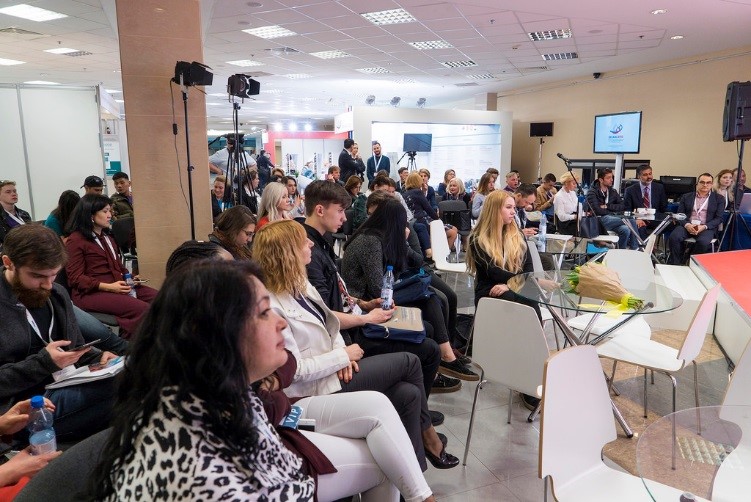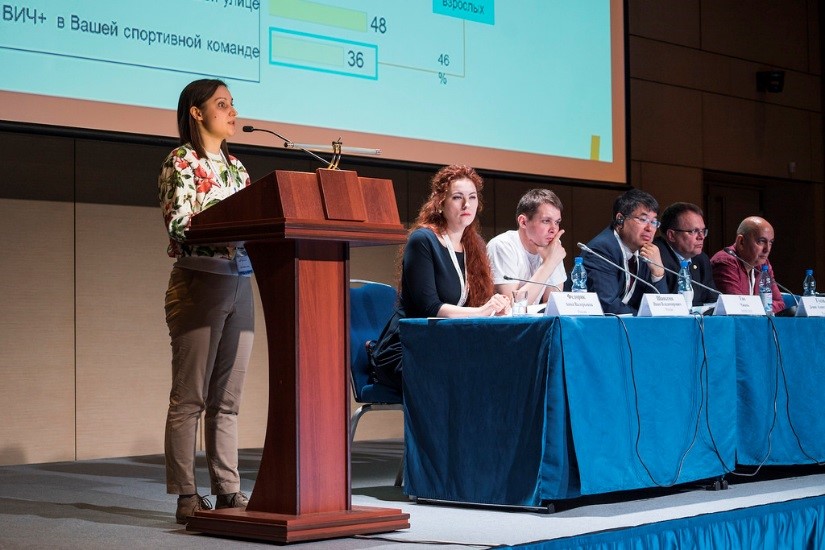On 18-20 April, Moscow hosted the 6th International Conference on HIV and AIDS in Eastern Europe and Central Asia EECAAC-2018 – the biggest event on prevention and treatment of HIV infection in the EECA region. The discussion platform brought together over 3,000 delegates from the public healthcare system, academia, education and civil society as well as experts from international organizations including UNESCO, WHO, UNAIDS and other.
On April 18, UNESCO Global Coordinator for HIV, Chief of section for health and education Chris Castle took part in a discussion at the Open space of the EECAAC-2018 “30 years of HIV infection in the Eastern Europe and Central Asia: what is needed to stop the epidemic by 2030?” Chris Castle based his analysis of the evolution of educational programmes in HIV prevention on long-standing experience of UNESCO and shared his perspective on a successful strategy that could make it possible to halt the spread of the HIV epidemic. More information about the discussion can be found here.
On April 19, a series of sessions were organized in the framework of the special programme “HIV, children, adolescents and youth”. The health and well-being of adolescents as well as their vulnerability to such risks like HIV depends on knowledge, skills and behavior patterns they adopt. Adolescents can get the necessary information on how to protect themselves not only at home but also at school. In this regard, the work aimed at HIV prevention in educational institutions should be carried out as part of integrated educational programmes on healthy lifestyle, sexual and reproductive health, and safe interpersonal relations.
During the session “HIV prevention among adolescents and young people”, youth activists and international experts shared their views on successful prevention programmes and the ways to improve the situation with comprehensive sexual education in schools in different countries.

Chris Castle presented a new edition of International technical guidance on sexuality education developed by UNESCO in cooperation with other UN system organizations. It is designed to empower decision-makers and educators that would like to introduce proper and evident-based school training programmes addressing reproductive health, HIV/STIs prevention and unwanted pregnancy as well as topics of relationships and love. Public sector activists from different countries (Brazil, Ukraine, South Africa and Russia), in turn, shared their experience in implementing projects focusing on HIV prevention and reproductive health.

For Levi Singh (Strategic Adviser on youth, SRHR Africa Trust), adolescents need to know more about relationships, health and their body not only to be more protected from HIV but also to go through puberty with less stress and more confidence:
“What made us think that it is enough to grasp the school courses in maths and literature to be ready for adult life? Why don’t we provide young people with knowledge and skills that are crucial for every grown-up: ability to explore what you really want and need; to perceive your own body as it is; to understand what health is; to ensure that your relationship is healthy, safe and happy; to distinguish what true love is?”
The second part of the session was devoted to the expertise in implementing integrated awareness-raising programmes in the EECA countries as well as to successful case studies from religious and student organizations working with young people. Tigran Yepoyan, UNESCO Regional HIV and health education advisor, discussed with other participants the outcomes of such programmes delivered by UNESCO IITE in Armenia, Kyrgyzstan and Belarus.
“Training of teachers and awareness-raising initiatives for parents along with development and promotion of online resources for adolescents have proved to be an efficient model to discuss healthy lifestyle and HIV prevention questions with young people”, says Tigran Yepoyan.
During the discussions “The role of young people in ending AIDS by 2030” Yulia Plakhutina, project coordinator at UNESCO IITE, presented the experience of the Unit for ICT in health education and elaborated on the use of information technologies to create efficient programmes on HIV prevention and reproductive health. “Teenagers are all very different. Some of them may seek answers for their questions not by asking their parents or teachers but by surfing on the Internet. This is why we can’t ignore this significant part of young people’s lives. It is very important that proper and truthworthy information regarding health and relationship is available online”. Yulia also mentioned the importance of creating quality outreach projects for parents and teenagers with the use of ICT. UNESCO IITE has been systematically supporting such initiatives: in 2016-2017 ‘Mamma Mia’ project offering live broadcast discussions about parent-child relationships, challenges of adolescence and issues that jeopardize communication between family members scored 1.5 million views.

On April 20, Tao Zhan, Director of UNESCO IITE, co-chaired the session “Information and Communication Technologies in the Prevention, Destigmatization, Diagnosis and Treatment of HIV”. In his welcoming speech, Mr. Zhan underscored the unique potential of ICTs in solving important social problems and increasing the effectiveness of curricular and extra-curricular activities on health.

On the same day, Yulia Plakhutina and Vitaliy Nikanovich (representative of the Belarusian Association of UNESCO Clubs, consultant at UNESCO IITE) talked about interactive tools for HIV prevention and health education – techniques empowering influencers to make lessons and awareness-raising campaigns “adolescent-friendly”. Yulia stressed the importance of listening to young people’s needs, concerns and problems so as to create content that is truly appealing for them. A set of science-popular ‘edutainment’ videos about relationships, health and HIV created jointly by UNESCO IITE and Nauchpok channel have proven to be a good example of such content. To date, the videos got up to 10 million views in total and were recommended by the national Ministries of education in Armenia, Belarus and Kyrgyzstan as additional resources for health education lessons.
